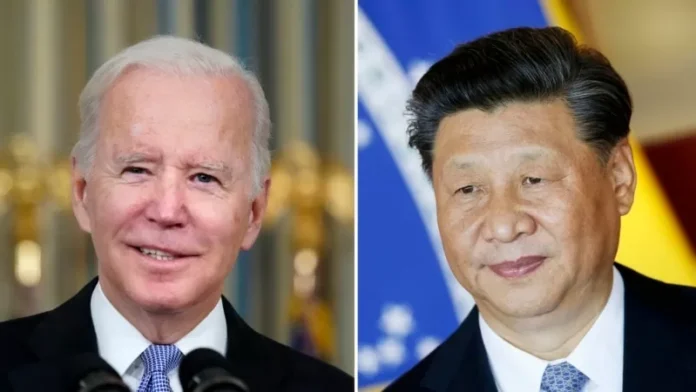In a private conversation between Chinese President Xi Jinping and U.S. President Joe Biden last year, Xi raised a request for the United States to change its language regarding Taiwan’s independence, according to two U.S. officials familiar with the matter.
During their meeting near San Francisco in November, Xi and his team asked Biden and his aides to adjust the language used in U.S. official statements. Instead of the current version, which states that the U.S. “does not support” Taiwan’s independence, China wanted the U.S. to say “we oppose Taiwan independence.” However, the U.S. has declined to make this change.
According to sources, Xi’s aides have continued to follow up and make the request in the months since the meeting. However, the White House has reiterated its stance that the U.S. does not support Taiwan’s independence. In response to a request for comment, the White House stated, “The Biden-Harris administration has been consistent on our long-standing One China policy.”
China’s foreign ministry also commented on the issue, stating that any questions should be directed to the U.S. government. They also emphasized that China’s position on Taiwan remains clear and consistent.
The issue of Taiwan’s independence has long been a sensitive topic in U.S.-China relations. The Republic of China government fled to Taiwan in 1949 after losing a civil war with Mao Zedong’s communists. Despite this, the government maintains that Taiwan is a sovereign, independent state and rejects China’s claim to the island.
For years, Chinese diplomats have been pushing the U.S. to change the way it refers to Taiwan’s status. However, the recent direct and renewed push from the leader level has not been reported before. It is not clear why Xi chose to raise the issue with Biden, but it could be due to his strong opposition to Taiwan’s independence and the increased military activities around the island in recent years.
The Biden administration has made it clear that they will not entertain the idea of changing the language to “oppose” Taiwan’s independence. Taiwan was also briefed on the recent overtures by Washington at a high level.
One senior Biden administration official stated that Chinese leaders would prefer if Biden made different statements about Taiwan, but he would stick with the standard U.S. formulation. During his time in office, Biden has upset China with his comments suggesting that the U.S. would defend Taiwan if it were attacked, deviating from the long-standing U.S. policy of “strategic ambiguity.”
If the U.S. were to change the language to state its opposition to Taiwanese independence, it would have significant consequences in the trade-rich Asia Pacific region, and with U.S. partners, competitors, and adversaries. Officials from two governments in the region told Reuters that they would interpret this change as a shift in U.S. policy to provide less support for Taiwan’s defense and diplomatic aspirations.
China has been increasing its military activities around Taiwan for the past five years, with almost daily drills and war games. Just this month, Beijing held a day of war games involving a record 153 military aircraft, simulating blockading ports and assaulting maritime and ground targets. A change in language could also be seen as a signal that the U.S. no longer supports peaceful talks for the resolution of Taiwan’s future, but instead stands against Taiwanese aspirations regardless of the circumstances.
Opinion polls in Taiwan show that most people support maintaining the status quo and do not seek to join with China or establish a new state. The U.S. State Department previously made changes to its website on Taiwan in 2022, removing statements about not supporting Taiwanese independence and acknowledging Beijing’s claim that Taiwan is part of China. This angered China, and the language was later restored.
The two leaders are expected to speak again before Biden’s term ends in January, most likely by phone or on the sidelines of the upcoming G20 summit in Brazil or APEC summit in Peru. APEC is one of the few international forums where both Taiwan and China participate.
The issue of Taiwan will be passed on to Biden’s successor, whether it be Democratic Vice President Kamala Harris or Republican former President Donald Trump, after the November 5th election. It is a delicate issue that will require careful handling and continued diplomacy between the U.S. and China.

